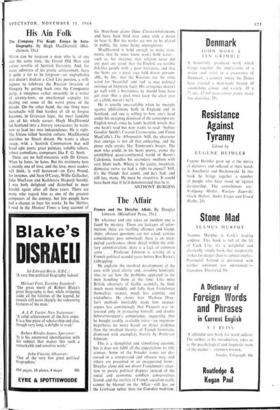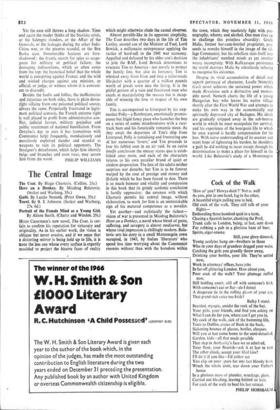The Affair
'BY whatever end one takes an incident one is faced by mystery. There are leakages of infor- mation; there are startling alliances and friend- ships; obvious questions are not asked; curious coincidences pass unnoticed; there is an unex- pected carelessness about detail within the mili- tary administration; there is a lack of common sense . . .' Professor Johnson is writing of a French political scandal years before Ben Barka's kidnapping.
He explains the involved development of the case with great clarity and, avoiding hindsight, tries to see how the problems appeared to the men handling them at the time. Like most British observers of Gallic scandals, he finds much more muddle and folly than Frenchmen themselves suspect, much less cunning and wickedness. He shows how Mathieu Drey- fus's methods inevitably made him suspect; argues less convincingly that Picquart was in- terested only in protecting himself; and doubts Schwartzkoppen's competence, suggesting that he bought readily available trivia—an ingenious hypothesis no more based on direct evidence than the involved theories of French historians, dismissed with exemplary brevity by Professor Johnson.
This is a thoughtful and stimulating account, but it does not fulfil all the expectations its title arouses. Some of the broader issues are dis- cussed in a compressed and obscure way, and others are presented in an exaggerated form : Dreyfus alone did not divert Frenchmen's atten- tion to purely political disputes instead of the social and economic conflicts conservatives feared, and the sterility of French socialism really cannot be blamed on the Affair—still less on the Jauresian rather than the Guesdist tradition. Yet the case still throws a long shadow. Time and again the reader thinks of the Stavisky crisis, or the Salengro slanders, or the Affair of the Generals, or the leakages during the other Indo- China war, or the piastres scandal, or the Ben Barka case. Innumerable features are fore- shadowed : the frantic search for spies as scape- goats for military or political failure; the damaging indiscretions, which so often come from the top; the hysterical belief that the whole world is conspiring against France; and the wild and wicked charges against any minister, or official, or judge, or witness whom it is conveni- ent to discredit.
Besides the faults and follies, the inefficiencies and injustices on both sides, there is plain down- right villainy from one poisoned political source, always the same. Perpetually frustrated in legiti- mate political contests, the French extreme right is well placed to profit from administrative con- flict, judicial favour, military prejudice and public resentment of national humiliation. From Dreyfus's day to ours it has (sometimes with Communist help) frequently, mendaciously and rnercilessly exploited slander and scandal as weapons to ruin its political opponents. The foreigner's detachment, which helps him identify twigs and branches and even trees, may screen







































 Previous page
Previous page